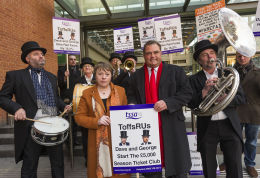Posted 4th January 2013 | 3 Comments
MPs warn against 'super peak' fares

Labour shadow transport secretary Maria Eagle and TSSA leader Manual Cortes joined a fares protest this week
A NEW report from the Commons Transport Committee has rejected the possibility of even higher peak fares and sounded a warning about the possible effects on the railway industry of making too many staff cuts.
It has also signalled that the Committee will be expecting ‘clear answers’ about the collapse of the West Coast franchise competition last October, and goes on to recommend that the Department for Transport should back away from organising the award and monitoring of passenger rail franchises.
The report – Rail2020 – comes just two days after there had been a storm of protest about the effect of 2013 fare increases.
Many commuters told reporters that the New Year rises, which averaged 4.2 per cent for season tickets and other regulated fares, were unacceptable. Unions and other rail campaigners claimed that the Government was ‘pricing people off the railways’ by allowing above-inflation fare increases to be imposed for the tenth year running.
The rises could have been higher, because the Government had originally announced that the January 2013 increases for regulated fares in England would amount to inflation – as measured by the previous July’s Retail Price Index – plus 3 per cent.
However, for a second year running the rise was later modified to RPI+1 per cent, which led to an average increase for all fares of 3.9 per cent, according to ATOC.
The Committee has warned against trying to manage demand by introducing higher peak fares. It said ‘there are clear limits to what demand management can achieve. Many lower-paid workers have no choice but to travel at peak times’.
It has also voiced doubts about the wisdom of imposing major staff reductions as a matter of course, saying that ‘any changes to staffing, terms and conditions and salaries should be made within the context of a wider programme of changes made throughout the industry and after full consultation with trades unions. Any changes in the numbers and duties of station staff should not be pursued solely to reduce costs but should reflect changes in passenger ticket-buying behaviour ...’. It is also concerned about the effect of staff cuts on safety and security.
The report says franchises should run from between seven and 10 years for the time being, and be preferably managed at ‘arms length’, because ‘we are not convinced that DfT as currently structured is best placed and resourced both to set rail policy and do the detailed work necessary to run each franchise competition’.
The Committee is staging a separate inquiry about the collapse of the West Coast compeition, but this report contained a warning to those involved, when it said: ‘Ministers, current and former, as well as senior officials, have many questions to answer about this debacle. We will be asking these questions, and expecting clear answers, in the weeks to come.’
First reactions to the report included a welcome for its stance on fares from the Transport Salaried Staffs’ Association. TSSA’s general secretary Manuel Cortes said: "This is the clearest warning to Ministers against going down the route of rationing rail travel by pricing passengers off trains through Super Peak Fare tickets."
Reader Comments:
Views expressed in submitted comments are that of the author, and not necessarily shared by Railnews.

Chris Neville-Smith, Durham
The TSC are quite right to warn against super-peak fares for commuters, but if the capacity crunch continues the way it's going, the Government may be left with no other option.
Unfortunately, a lot of people would rather use expensive rail fares as an excuse to not invest in more rail capacity rather than a reason to do so. I just hope that enough of the public stay on board when it becomes clearer how much it will cost to address the problem.
James Pritchard, Southampton
How can the Unions complain about pricing people off the railways? If they didn't threaten strike action every time their greedy pay demands weren't met then it would be a fairer system all round.
Philip Russell, Carlisle
On todays passanger railway operation ,it seems every organisation, committee, union or individual has a different opinion on its problems and how they should be tackled,however history seems to show that without a strong leader who has a clear set of ideas and how to implement them in the style of Robert Reid or Chris Green in BR days or Herbert Walker before that ,i cant see much changing for many years to come .